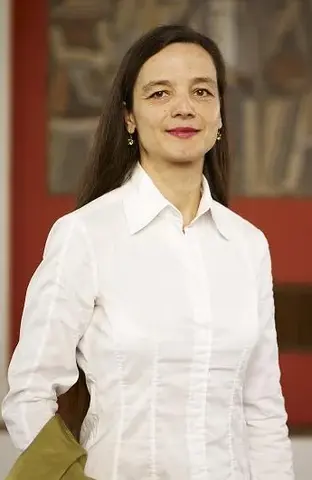Fellow / Sprecherin der Kolleg-Forschungsgruppe (Max-Weber-Kolleg für kultur- und sozialwissenschaftliche Studien)
Sprechzeiten
nach Vereinbarung
Postanschrift
Universität Erfurt
Max-Weber-Kolleg für kultur- und sozialwissenschaftliche Studien
Postfach 90 02 21
99105 Erfurt
Professorin für Geschichte und Kulturen der Räume in der Neuzeit (Historisches Seminar)
Besucheranschrift
Campus
Historisches Seminar
C18 – Lehrgebäude 4
Alfred-Weber-Platz 4
99089 Erfurt
Postanschrift
Universität Erfurt
Historisches Seminar
Postfach 90 02 21
99105 Erfurt
Sprecherin (Historisches Seminar)
Sprechzeiten
n. Vbg.
Besucheranschrift
Campus
Historisches Seminar
C18 – Lehrgebäude 4
Alfred-Weber-Platz 4
99089 Erfurt
Postanschrift
Universität Erfurt
Historisches Seminar
Postfach 90 02 21
99105 Erfurt
Mitglied, Fachrichtung "Geschichte und Kulturen der Räume in der Neuzeit" (Erfurter RaumZeit-Forschung)
Postanschrift
Universität Erfurt
Erfurter RaumZeit-Forschung
Postfach 90 02 21
99105 Erfurt
Programmbetreuerin Master Sammlungsbezogene Wissens- und Kulturgeschichte (Philosophische Fakultät)
Sprechzeiten
nach Vereinbarung per E-Mail
Besucheranschrift
Campus
Philosophische Fakultät
C18 – Lehrgebäude 4
Alfred-Weber-Platz 4
99089 Erfurt
Postanschrift
Universität Erfurt
Philosophische Fakultät
Postfach 90 02 21
99105 Erfurt
Mitglied des Auswahlausschusses des Max Weber Kollegs (Max-Weber-Kolleg für kultur- und sozialwissenschaftliche Studien)
Besucheranschrift
Campus
Max-Weber-Kolleg für kultur- und sozialwissenschaftliche Studien
C18 – Lehrgebäude 4
Alfred-Weber-Platz 4
99089 Erfurt
Postanschrift
Universität Erfurt
Max-Weber-Kolleg für kultur- und sozialwissenschaftliche Studien
Postfach 90 02 21
99105 Erfurt
Berufungsbeauftragte (Präsidium)
Besucheranschrift
Campus
Präsidium
C18 – Lehrgebäude 4
Alfred-Weber-Platz 4
99089 Erfurt
Postanschrift
Universität Erfurt
Präsidium
Postfach 90 02 21
99105 Erfurt
Ständiges Tenure Board (Mitglied) (Präsidium)
Kontakt
Besucheranschrift
Campus
Präsidium
C18 – Lehrgebäude 4
Alfred-Weber-Platz 4
99089 Erfurt
Postanschrift
Universität Erfurt
Präsidium
Postfach 90 02 21
99105 Erfurt

Zur Person
Curriculum Vitae
Susanne Rau (M.A. in History, Romance Languages and Literatures and Philosophy in 1997, PhD in medieval and modern History in 2001 at Hamburg University, Habilitation in 2008 at Dresden University), is, since 2009, professor of spatial history and cultures at Erfurt University, Germany; since 2011 regular visiting professor at the ENS Lyon and the CIHAM, France, and spokesperson of the research group “Spatio-Temporal Studies Erfurt”. She has published widely in urban history and in the theory, history and anthropology of spaces. Currently, she is leading a research project on the history of cartography in Europe and India and, since 2018, co-directing the newly established Kolleg-Forschungsgruppe „Religion and Urbanity: Reciprocal Formations“ (with Jörg Rüpke).
Forschungsprojekt
Book Project: "History, Theory and Analysis of Spatio-temporal Dynamics of the Formation of Urbanity"
Within the framework of the research group "Religion and Urbanity" I will not only work on a concept for the investigation of urbanity from a transcultural perspective, but also conduct case studies on different cities in Europe and South Asia. In the case of European cities, the focus is on Hamburg and Lyon. In South Asia, the focus is on cities on the west coast of India: Surat, Mumbai, Goa, Kozhikode and Kochi. In contrast to the European cities, the presence of even more diverse religious groups and their changing constellations over time can be examined here. Which factors have triggered religious change and which urbanity-generating effects religion has had are the guiding questions of the Humanities Centre for Advanced Studies (KFG) like most of its projects.
The book project, which goes beyond the case studies, has the preliminary title "History, Theory and Analysis of Spatio-temporal Dynamics of the Formation of Urbanity". This project aims to explore the central question under which conditions, on which occasions, by which groups and in which forms urbanity emerges (and disappears) - not only with regard to religious actors, practices or institutions - for which the continuous exchange with all academic members of the KFG is of particular importance. This is consciously a historical as well as a systematic question, because cities and the ways of life that were formed there represent a quasi worldwide phenomenon that goes back far in time. A purely historical approach would not be able to explain the phenomenon of the urban. In order to be able to observe and compare processes, however, a precise method must be described and analytical terms provided for historical investigations.
Publikationen
- History, Space, and Place, London and New York: Routledge 2019.
- Rhythmusanalyse nach Lefebvre, in: Taktungen und Rhythmen. Raumzeitliche Perspektiven interdisziplinär, hg. von Sabine Schmolinsky, Diana Hitzke u. Heiner Stahl, Berlin u. Boston 2018, S. 9-24.
- Raumforschung, historische (mit Benjamin Steiner), in: Friedrich Jaeger (Hg.), Enzyklopädie der Neuzeit Online (2017), URL: <http://dx.doi.org/10.1163/2352-0248_edn_a6014000>
- Spacetime of the Imperial (hg. mit Holt Meyer, Katharina Waldner), Berlin u. Boston 2016.
- Raum: Theorien und Konzepte – eine Annäherung, in: Raumkonzepte in der Theologie. Interdisziplinäre und interkulturelle Zugänge, hg. von Angela Kaupp, Ostfildern 2016, S. 21-38.
- Räume der Stadt. Eine Geschichte Lyons 1300-1800, Frankfurt/Main 2014.
- Topographien des Sakralen. Religion und Raumordnung in der Vormoderne (hg. mit Gerd Schwerhoff), Hamburg u. München 2008.

